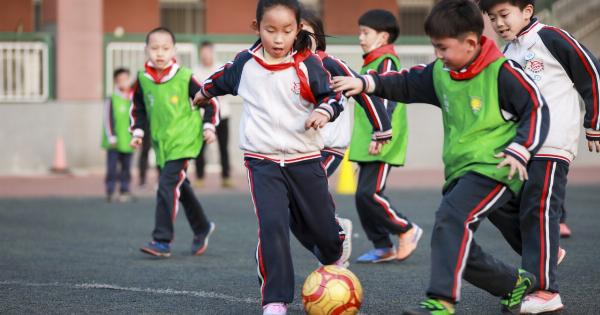Sports participation has long been recognized as a valuable extracurricular activity for students.
While it offers numerous physical and mental health benefits, recent studies have also shown a positive correlation between sports participation and academic success. Engaging in sports not only cultivates discipline and teamwork but also enhances cognitive abilities, time management skills, and overall academic performance.
In this article, we will explore the various ways in which sports participation positively influences academic achievement.
Improved Cognitive Function
Engaging in sports requires quick thinking, strategizing, and problem-solving skills. Athletes have to analyze their opponents, anticipate their moves, and make split-second decisions.
This constant mental engagement enhances their cognitive function, including memory, attention, and problem-solving abilities. Research has shown that regular participation in sports leads to improvements in academic skills such as reading, mathematics, and language.
Discipline and Goal Setting
Athletes learn the importance of discipline and goal setting from an early age. Sports require regular practice, adherence to rules, and consistency in training. These qualities transfer to academic pursuits as well.
By setting goals for themselves, athletes develop a sense of direction and purpose, which positively affects their academic progress. They learn to manage their time effectively, prioritize tasks, and work towards achieving specific objectives.
Stress Reduction
Academic pressure can be overwhelming for students. Engaging in sports provides an outlet for stress and helps develop coping mechanisms. Physical activity releases endorphins, which are known as “feel-good” hormones.
These hormones improve mood and reduce stress and anxiety levels. Consequently, athletes are better equipped to handle academic stress, leading to increased focus and a better overall mental state.
Teamwork and Collaboration
Participating in team sports fosters a sense of camaraderie and teaches students the importance of teamwork and collaboration. Athletes learn to work together towards a common goal, communicate effectively, and trust their teammates.
These skills translate into the academic setting, where students often have to work on group projects or participate in team discussions. The ability to collaborate with others enhances their problem-solving ability and overall academic performance.
Time Management and Organization
Sports involvement requires balancing academic commitments with training and competition. Athletes develop strong time management skills to ensure they meet both their athletic and academic responsibilities.
They learn to prioritize their tasks, create schedules, and efficiently manage their time. This ability to organize and allocate time effectively carries over into their academic life, helping them stay on top of assignments, exams, and other academic obligations.
Improved Physical Health
Regular physical activity through sports improves overall physical health. Students who engage in sports are more likely to have higher energy levels, better sleep patterns, and improved general health.
Research has shown that physical fitness positively impacts cognitive function, memory retention, and information processing. By maintaining a healthy lifestyle through sports participation, students are better equipped to handle the academic demands placed upon them.
Increased Motivation and Confidence
Athletes often set personal goals and strive to improve their performance. As they witness their progress and achieve milestones, their motivation and self-confidence increase.
This drive and belief in their abilities carry over to their academic pursuits, where they develop a growth mindset and believe in their capacity to succeed. The enhanced self-esteem and motivation obtained through sports contribute to higher academic achievement.
Social and Emotional Development
Participating in sports exposes students to a diverse range of individuals and cultures. They learn to interact and cooperate with people from different backgrounds, developing empathy and cultural sensitivity.
Athletes often forge lifelong friendships, creating a supportive social network. Additionally, sports provide an avenue for emotional expression, enabling students to channel their emotions in a healthy and constructive manner.
Such social and emotional development positively impacts their overall well-being, mental health, and academic performance.
Positive Behavior and Discipline
Athletes are required to adhere to rules, regulations, and codes of conduct both on and off the field. This fosters a sense of responsibility and develops good behavior and discipline.
It encourages athletes to make ethical choices, maintain a healthy lifestyle, and avoid engaging in negative behaviors. These qualities translate into academic settings, promoting integrity, respect, and self-control among student athletes.
Academic Support Networks
Sports programs often have a network of academic support structures in place to assist student athletes. These resources may include tutoring programs, study halls, and academic advising.
Athletes can benefit from additional support, guidance, and resources that enhance their academic performance. They are encouraged to seek assistance when needed and are provided with tools to succeed both athletically and academically.
Conclusion
The correlation between sports participation and academic achievement is evident. Engaging in sports not only improves physical health but also enhances cognitive function, discipline, time management skills, and overall academic performance.
The lessons learned through sports, such as teamwork, goal setting, and problem-solving, transfer to the academic realm, enabling students to excel in their studies. It is crucial for educators, parents, and policymakers to recognize the value of sports in nurturing well-rounded individuals and to support initiatives that encourage sports participation alongside academic pursuits.






























